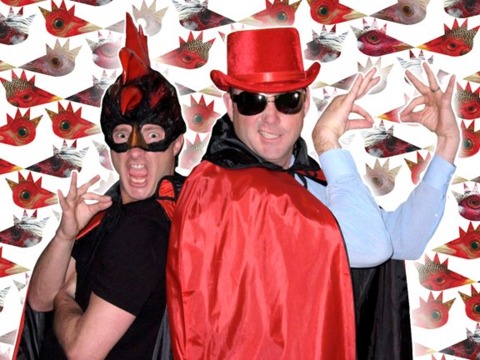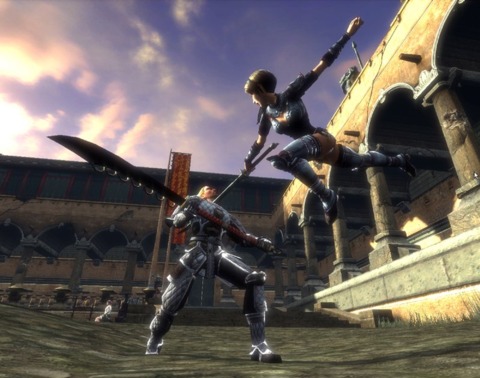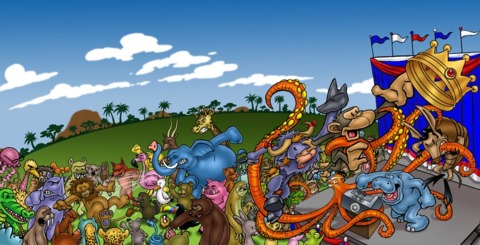Q&A: Gamecock's Harry Miller crows
Gathering of Developers' cofounder talks about getting the band back together and providing indie studios with a new way to get their original titles made.
When it was formed in June of 1998, the Gathering of Developers was intended to be a different kind of publishing company, one that could treat independent studios better than existing publishers without sacrificing profit along the way. However, after running into money trouble multiple times, the company was acquired by Take-Two Interactive in 2000.

Now two of the original Gathering of Developers executives have reunited to have another go at creating a publishing alternative for independent developers. Gathering cofounders Harry Miller and Michael Wilson today announced the formation of Gamecock Media Group, and revealed the company's initial slate of five games.
The company line is that Gamecock will bring originality and humor back to gaming, and the initial lineup of games reflects that objective. Gamecock has already confirmed a zoological party game from Stubbs the Zombie developer Wideload Games, a film noir-inspired action adventure game in a world ruled by bugs, and a game about fungi in the midst of a civil war.
However, the type of games it publishes isn't the only unique aspect of Gamecock. GameSpot asked the publisher's cofounder Harry Miller about the business model that allows it to take chances on original franchises and smaller developers while still getting its games in front of a large audience. And yes, he also explained the reasoning behind the company's name.

GameSpot: So what are the basics of Gamecock?
Harry Miller: Michael [Wilson, Gamecock cofounder] and I started Gathering of Developers a while back, and of course sold that and have been out of [the game industry] for a while. Basically we got back together and decided to try it again, under pretty much the same principles of last time. The premise was to be artist driven. When you go to buy a movie or a song or whatever, you don't go there to find your favorite [publisher] for a book or your favorite movie studio; it's the artist you're looking for and respect. It's not there yet for games, but we think it should be heading in that direction, so we give credit where credit's due. What we try and focus on is new [intellectual property], new content, and indie developers.
GS: Are there any specific differences in your approach from the way you did Gathering of Developers?
HM: There are a few differences. We were sort of a conglomerate last time. We had to shoestring it last time and had no assets, so we enticed developers to join us by giving them stock in our company. This time it's just a true publishing deal. And last time, we had never been a publisher before and learned a lot of things along the way. This time we hope to be a little smarter and do a better job.

GS: So what's going to separate you, as far as an independent developer is concerned, from the publishers that are out there already?
HM: One is that we are actively looking to handle new IPs from independent developers, and that alone is [different]. Most of the developers we know who have worked on incredible content in the past that has done well commercially have an incredibly tough time getting new IP deals signed. And if they do, there are strings attached, like they don't get to keep the IP. Or there are structures in the contract such that the publisher has the right to buy the company or buy the IP at a certain multiple of revenue, which never really works out in the developer's interest. If the publisher decides to go ahead and act on it, that means the developer or IP is worth a lot more than what they're going to pay for it.
GS: So in your case, will the independent developers keep all their IPs?
HM: In the deals that we have, the developer keeps all of the IP.
GS: What is in it for Gamecock to be doing the work of publishing and establishing these IPs and not retaining them?
HM: We feel we have plenty of value being the publisher. And with the deal come sequel rights as well. So we have the opportunity to profit handsomely and be part of that whole business. And that's where the real value comes from on our side. Often times when a publisher buys the property, they drive it into the ground, whereas if you allow the developers to retain ownership, the game tends to remain alive and exciting, even when sequels are made.
GS: So what's the story behind the name?
HM: The idea is that as a publisher, we're more of a service group. So our job as part of the deal is to promote the developer. It's their name on the box. We do advertising and promotions, but it's their name in the highlight and we're in the background. And that's how it should be. So our name is silly because it doesn't really matter.

GS: The original announcement about Gamecock said the company was taking its lead from the independent film scene. Are you going to investors to finance these games, or are you putting up the money yourselves?
HM: It's a case-by-case scenario, but we are well funded, and the majority of projects we're doing are funded by us.
GS: Why hasn't the film-financing model taken off in games yet?
HM: I think why film financing hasn't worked--and it's been brought to the industry multiple times--is having to nail down release dates exactly, and there are other factors as well as far as the risk associated with it. Games and film are similar, but they're dissimilar enough to where it scares a lot of people coming in from the movie side.
GS: As a publisher, how are you going to get your games in front of the most people? How are you going to get them on the shelves at Wal-Mart?
HM: When we started Gathering of Developers, we were told by everyone that we couldn't get shelf space. No way. We couldn't compete with any of the big ones. And that's not true. It just costs money to get end caps and put your games front and center. As long as you have the money to market your title, you can get distribution. Distribution's for sale.
Last time, people told us we couldn't get distribution. Our first major title, Railroad Tycoon II, sold a million units. Our first title, Jazz Jackrabbit 2, was a side-scroller, and it got into Wal-Mart and everywhere else. So it's not much of an issue.
GS: You've already announced five major titles. How big can your operation get? Is it scalable?
HM: It's scalable, but we're a small group. Right now there are six of us and there will be probably 10 to 12 of us by the end of the year. We don't require a whole lot of warm bodies in the office. We outsource quite a bit as well. We outsource our advertising company and our distribution, things like that. We manage a lot, but we don't do a lot in-house. It also helps us be more competitive because we have a very low overhead. We can afford to do titles that a lot of major companies would have to pass up because they don't think they could hit the margins they need for all the overhead they carry with them.
Got a news tip or want to contact us directly? Email news@gamespot.com
Join the conversation